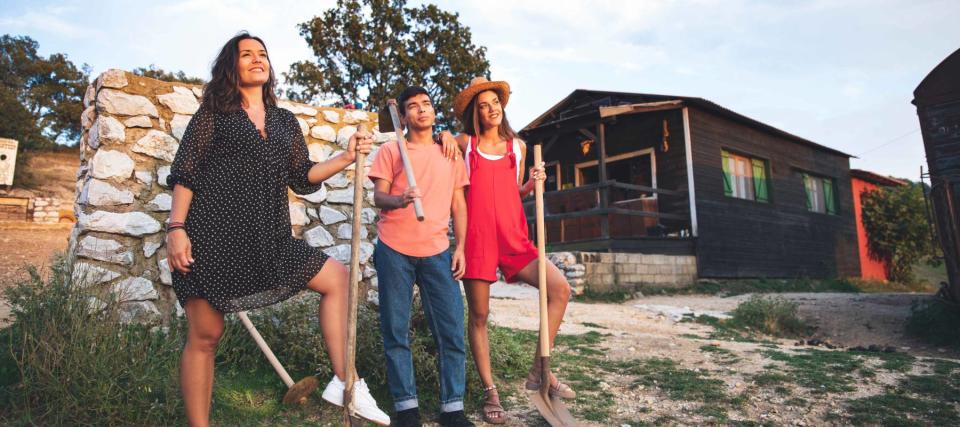Dealing with co-buyer’s remorse? Here’s how to cut ownership ties without unraveling your friendships

Many people made major (and often impulsive) life changes during the early days of the COVID-19 pandemic — from quitting their job to moving out of the city — that they later regretted. Indeed, nearly 3-in-4 of U.S. homeowners had regrets about purchasing their homes in 2022. So what happens if they want out?
Let’s say, for example, a 34-year-old woman decided to purchase a lake house rental during the first year of the pandemic. She couldn’t afford it on her own, so she convinced two of her close friends to become co-buyers on the property. The idea was that they’d have a vacation home for girls’ getaways, while earning passive rental income when they weren’t using it.
Don't miss
Car insurance premiums in America are through the roof — and only getting worse. But 5 minutes could have you paying as little as $29/month
Commercial real estate has beaten the stock market for 25 years — but only the super rich could buy in. Here's how even ordinary investors can become the landlord of Walmart, Whole Foods or Kroger
These 5 magic money moves will boost you up America's net worth ladder in 2024 — and you can complete each step within minutes. Here's how
But, as she quickly learned, rental properties can be a lot of work — and a lot of extra money. The lake house was deteriorating, and the amount of money they were spending on repairs was more than what they were bringing in from rentals. She also found that dealing with repairs, maintenance and rental reservations was taking up all her spare time and energy.
She wanted out. But she was worried that if she cut ownership ties, she’d also end up cutting ties with her friends. This situation can be awkward, so it’s worth laying out an exit strategy before you sign the dotted line.
Pros and cons of buying a house with friends
More people are buying a home with someone other than a romantic partner, and for good reason: rising home prices and mortgage rates have shut many Americans out of the housing market, especially first-time homebuyers.
While half of homebuyers (50%) co-bought with a partner or spouse, 14% co-bought with a friend and 12% co-bought with a relative, according to 2023 housing stats from Zillow. Co-buyers who were single, separated, divorced or widowed cited affordability as a major reason for co-buying. They also said it was easier to get approved for a mortgage.
While buying a house with friends can address the issues of affordability and getting approved for a mortgage, it also means you’re tying your finances to another person (or group of people), which comes with legal and financial risks — so you should go into any arrangement with your eyes wide open.
For example, in the case of the 34-year-old woman who bought a lake house rental with two friends, if one co-buyer defaults on her portion of the mortgage, the other co-buyers would be responsible for paying it (along with her share of property taxes and bills). Otherwise, it would impact their credit scores, too. This could also put a strain on the friendship.
Read more: Rich, young Americans are ditching the stormy stock market — here are the alternative assets they're banking on instead
How to exit a co-buying arrangement
If you choose to buy a house with a friend or group of friends — whether a primary residence or rental property — this arrangement could prematurely come to an end for any number of reasons. Maybe one co-buyer decides to get married or takes a new job in another state. Or, maybe one co-buyer is having buyer’s remorse and simply wants out.
But joint tenancy arrangements can be difficult to get out of, particularly if one person isn’t ready to sell or can’t afford to buy the other out. That’s where a co-buying contract can help. This contract should be drawn up by a lawyer before the house is purchased. It should lay out each person’s ownership stake (it doesn’t have to be an even split) and what portion of the mortgage, property tax and utilities each will be responsible for. For a rental property or vacation home, it should also outline each person’s management responsibilities.
A co-buying contract should also include an exit strategy if one co-buyer wants to sell or move out — for example, how they’ll agree on a buyout price or how they’ll divide any proceeds if they collectively decide to sell the house. It could also cover other scenarios, such as what happens if one person defaults on their portion of the mortgage.
For this 34-year-old woman who wants to walk away from her lake house rental investment, she’s hoping she can come to an amicable resolution with her friends, without destroying those friendships. Having a legally binding contract with the terms laid out in advance could have saved her a lot of this stress.
What to read next
Cost-of-living in America is still out of control — use these 3 'real assets' to protect your wealth today, no matter what the US Fed does or says
Lock in juicy quarterly income through this $1B private real estate fund — even if you’re not a millionaire. Here’s how to get started with as little as $10
Jeff Bezos and Oprah Winfrey invest in this asset to keep their wealth safe — you may want to do the same in 2024
This article provides information only and should not be construed as advice. It is provided without warranty of any kind.